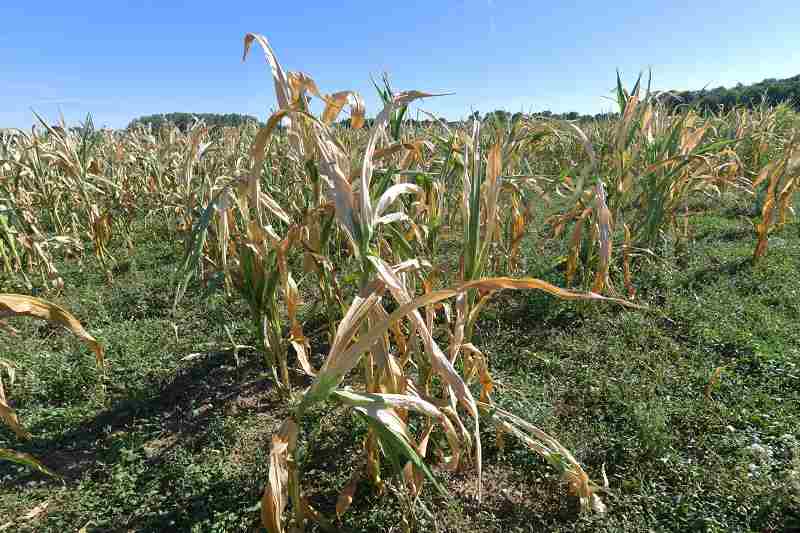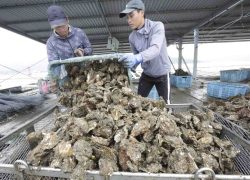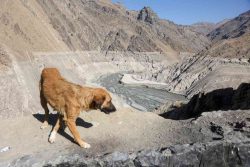
A dried corn field is seen amid a heat wave in Courcemont, France, on Aug. 3.
13:16 JST, August 13, 2022
PARIS (AFP-Jiji) — As much of Europe bakes in a third heat wave since June, fears are growing that extreme drought driven by climate change in the continent’s breadbasket nations will dent stable crop yields and deepen the cost-of-living crisis.
The European Commission on Aug. 3 urged EU member states to reuse treated urban wastewater as irrigation on the continent’s parched farms, after France and parts of England saw their driest July on record.
In France, where an intense drought has hammered farmers and prompted widespread limits on freshwater use, there was just 9.7 millimeters of rain last month, Meteo-France said.
That was 84% down on the average levels seen for July between 1991 and 2022, making it the driest month since March 1961, the agency added.
The southwestern region of Gironde, already devastated by last month’s wildfires, saw a maximum temperature of 39.6 C on Aug. 3.
Animals, including lions and monkeys, evacuated two weeks ago due to the blazes there returned to their zoo on Aug. 3.
Farmers nationwide are reporting difficulties in feeding livestock because of parched grasslands, while irrigation has been banned in large areas of the northwest and southeast due to freshwater shortages.
Environment Minister Christophe Bechu said July’s rainfall represented “just 12% of what’s needed.”
France is the fourth-largest exporter of wheat and among the top five exporters of maize globally. Poor harvests due to drought may heap further pressure on grain supplies after Russia’s invasion of Ukraine caused global shockwaves.
“Our food system has been under stress for a while, and with the supply issues from Ukraine, that has only gotten worse,” said Shouro Dasgupta, environmental economist at the Euro-Mediterranean Center on Climate Change.
“These heat waves are on top of droughts and will see crops wither faster.”
Dasgupta said that extreme heat driven by climate change is also contributing to food price inflation for consumers and harsher conditions for producers.
“Droughts and heat waves impact people’s livelihoods. People will be less able to afford food,” he told AFP.
“And during heat waves, outdoor workers are only able to work fewer hours, which brings cascading impacts for supply.”
‘Food systems not working’
Britain’s Met Office last week said much of southern and eastern England had their driest July on record.
Some water providers have already announced restrictions affecting millions of people, and fruit and vegetable producers have announced several crop losses such as beans and berries.
Britain’s inflation surged to a 40-year high in June on rising fuel and food prices.
Elizabeth Robinson, director of the London School of Economics’ Grantham Research Institute on Climate Change and the Environment, said spiraling food costs — worsened by heat-induced losses in Europe and Britain — were a sign that “food systems aren’t working for people.”
“There are some long-term, difficult conversations that need to be had, particularly about food waste and the diversion of grains away from food for people to feed animals,” she told AFP.
In Spain, already parched under a prolonged hot spell, the heat is worsening water shortages that have dogged Spanish agriculture since last winter, with local restrictions on water usage in the most affected regions.
The government said last week that Spain’s reservoirs are at just 40.4% capacity.
Juan Carlos Hervas, from the COAG farmers’ union, told AFP that Spain’s olive harvest from unirrigated land will come in at less than 20% of the average of the last five years.
Spain supplies nearly half the world’s olive oil.
‘Worst drought this century’
Portugal, where temperatures yet again breached the 40 C mark last week, is experiencing “the worst drought this century,” Environment Minister Jose Duarte Cordeiro warned last month.
Portugal along with Poland has asked its citizens to cut down on water use to ease the pressure.
“Water authorities across Europe are unprepared for what scientists have been saying for three decades,” said Dasgupta.
The European Commission in an updated assessment last month found that nearly half — 44% — of the EU and Britain was currently experiencing “warning” levels of drought.
It warned that exceptionally low soil moisture levels meant several countries, including France, Romania, Spain, Portugal and Italy will experience reduced crop yield in 2022.
“The unfavorable forecasts for the coming months may compromise the water supply and will likely keep the competition for this resource high,” it said.
A separate EU bulletin from last month said that EU yields of soybean, sunflowers and maize were already 9% below average.
On Aug. 3, Virginijus Sinkevicius, EU commissioner for the environment, fisheries and the oceans, urged EU nations to reuse more of its wastewater.
“We need to stop wasting water and use this resource more efficiently to adapt to the changing climate and ensure the security and sustainability of our agricultural supply,” he said.
Top Articles in Science & Nature
-

Japan Institute to Use Domestic Commercial Optical Lattice Clock to Set Japan Standard Time
-

iPS Treatments Pass Key Milestone, but Broader Applications Far from Guaranteed
-

Record 700 Startups to Gather at SusHi Tech Tokyo in April; Event Will Center on Themes Like Artificial Intelligence and Robotics
-

iPS Cell Products for Parkinson’s, Heart Disease OK’d for Commercialization by Japan Health Ministry Panel
-

Japan to Ban Use of Power Banks on Airplanes
JN ACCESS RANKING
-

Japan PM Takaichi’s Cabinet Resigns en Masse
-

Japan Institute to Use Domestic Commercial Optical Lattice Clock to Set Japan Standard Time
-

Israeli Ambassador to Japan Speaks about Japan’s Role in the Reconstruction of Gaza
-

Man Infected with Measles Reportedly Dined at Restaurant in Tokyo Station
-

Videos Plagiarized, Reposted with False Subtitles Claiming ‘Ryukyu Belongs to China’; Anti-China False Information Also Posted in Japan






















